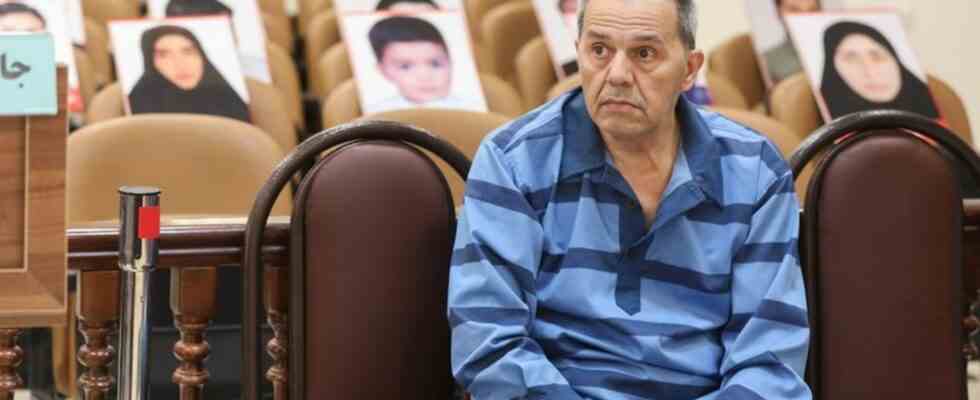human rights
Sharmahd case: Berlin expels two Iranian diplomats
The undated photo shows Djamshid Sharmahd in a Tehran Revolutionary Court. The German-Iranian has been sentenced to death in a controversial trial. photo
© Koosha Falahi/Mizan/dpa/dpa
Foreign Minister Baerbock had announced a clear reaction to the death sentence against the German-Iranian Djamshid Sharmahd. Now she is there. How is Tehran reacting?
In response to the death sentence passed by a court in Tehran against German-Iranian Djamshid Sharmahd, the German government has expelled two Iranian diplomats. This was announced by Foreign Minister Annalena Baerbock (Greens) in Berlin.
A revolutionary court had held the 67-year-old Sharmahd responsible for a terrorist attack, among other things, as the justice portal Misan announced on Tuesday.
“We call on Iran to revoke the death sentence”
Baerbock explained that she had summoned the charge d’affaires of the Iranian embassy in view of the death sentence. This is considered a sharp diplomatic tool. The chargé d’affaires had been informed “that we do not accept the massive violation of the rights of a German national,” the foreign minister said. As a result, the federal government declared two members of the Iranian embassy to be undesirable and asked them to leave Germany at short notice.
A spokesman for the Foreign Ministry in Berlin did not want to go into the functions of the deportees within the Iranian embassy on Wednesday. It is about two people who are registered on the diplomatic list of the Iranian embassy in Berlin. “You can assume that these are chosen in such a way that Iran is made aware of the scope of the situation in an appropriate manner,” he added when asked.
Tehran blames Sharmahd for terrorist attacks
The Iranian judiciary also blames Sharmahd for planning several terrorist attacks. The court also charged him with cooperation with foreign secret services. The allegations cannot be verified. Death penalty in Iran is usually carried out by hanging.
Chancellor Olaf Scholz described the death sentence as “unacceptable”. “The Iranian regime fights its own people in every possible way and disregards human rights,” Scholz wrote on Twitter on Wednesday. “We condemn this in the strongest possible terms and call on the Iranian regime to reverse the verdict.” Baerbock also called for Sharmahd to be allowed a fair and constitutional appeals process.
According to a spokesman for the Foreign Office, the German embassy in Tehran is in contact with his relatives, but there is no direct contact. The embassy has repeatedly worked at all levels to gain consular access to Sharmahd. Iran has consistently denied this, citing its dual citizenship. In addition, intensive attempts were made again and again to observe his process. Iran has repeatedly rejected this.
Meanwhile, the German ambassador in Theheran once again formally conveyed the German government’s protest to the Iranian government.
Tehran imposes counter-sanctions
Relations between Iran and Western countries, including Germany, had recently deteriorated massively. Baerbock and representatives of the EU had sharply criticized Tehran for their violent handling of protests in Iran against the country’s repressive leadership and Islamic system of rule. On Monday, the EU imposed new sanctions on Tehran, including on prison directors, prosecutors and judges.
On Tuesday, Iran responded with counter-sanctions against 23 people and 13 organizations. The members of the Bundestag Renata Alt (FDP), Roderich Kiesewetter (CDU) and Michael Roth (SPD) are affected. You recently made critical comments about Iran. The punitive measures include entry bans and the freezing of possible assets in Iran.
German-Iranian parliamentary group to be put on hold
According to a media report, the Bundestag will draw consequences from the sanctioning of the MPs. As the editorial network Germany (RND) reports, citing the first parliamentary secretary of the SPD parliamentary group, Katja Mast, the Council of Elders of the Bundestag will end the work of the German-Iranian parliamentary group in the coming week for the time being.
“In view of the absurd sanctioning of German members of the Bundestag by the Iranian regime, a suspension of the German-Iranian parliamentary group is overdue,” Mast told RND. “We will also formally suspend the parliamentary exchange, which has been idle for a long time, in the next week of the session.”
The trigger for the nationwide protests in Iran was the death of the Iranian Kurd Jina Mahsa Amini. She died in police custody on September 16 after being arrested by the Morality Police for breaking the Islamic dress code. According to estimates by human rights activists, 20,000 demonstrators were arrested during the protests. Several demonstrators were sentenced to death and four have been carried out.

